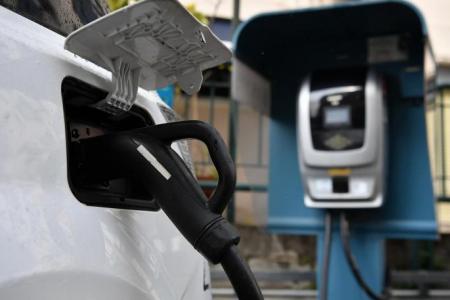New COE criterion for EVs, more charging points to be installed in HDB carparks
Fully electric vehicles (EVs) with up to 110kW of power will come under the Category A certificate of entitlement (COE) from May onwards, in a move to bring more mass-market cars into that category.
Announcing this on Tuesday (March 8), Transport Minister S. Iswaran also unveiled plans to make every HDB town "EV-Ready" by 2025 - by installing at least three charging points in nearly 2,000 HDB carparks over the next three to four years.
More charging points will be installed at carparks where there is demand and adequate electrical capacity, he said, adding that a tender will be called in the first half of this year.
Raising the maximum power output for electric cars in Category A will increase the number of choices in that category for motorists, Mr Iswaran said during the debate on the Government's sustainability plans.
Category A COEs currently apply to cars with engine capacity up to 1,600cc and a maximum power output (MPO) of 97kW or 130bhp, with no distinction for EVs.
The added 110kW criteria applies exclusively to fully electric vehicles, and will apply to EVs registered with COEs obtained from May onwards. EVs with more than 110kW will come under Category B.
Under the new criteria, mass market EVs that will come under Category A include the Hyundai Ioniq Electric and Kona Electric, Kia Niro Electric Short Range and Nissan Leaf.
Currently, the Hyundai Ioniq Electric is listed at $172,888 inclusive of a Category B COE.
The move means that buyers of these mass market models would stand to pay less as they would not be competing in the Category B COE segment which tends to have higher premiums. At the latest COE tender, the premium for Category A was $63,000, about $30,590 less than for Category B.
Mr Iswaran noted that the COE criterion of 97kW was introduced in 2013, to address the market trend then of many luxury petrol cars with smaller but turbo-charged engines, and shift these into Category B.
Back then, the popularity of sub-1,600cc models from premium brands like Audi, BMW and Mercedes-Benz were seen by industry watchers to be responsible for the high Category A COE premiums then, edging out the mass-market car buyer.
Premiums for the category was $92,100 in January 2013. This was less than $4,500 below Category B prices at the same tender.
The imposition of the MPO threshold pushed some of these models to Category B, tempering bidding in Category A.
"However, mass-market electric cars in international markets tend to have a MPO of 110kW or lower. Locally, more mass-market electric vehicle models with a MPO above 97kW have been introduced in the last year," he said in response to MPs who asked about efforts to promote EV adoption, including Mr Saktiandi Supaat (Bishan-Toa Payoh GRC).
Replying to Mr Ang Wei Neng (Jurong GRC), he said more than 80 per cent of electric car users live in private housing today, many in condominiums and private apartments.
A grant introduced last July to incentivise non-landed private residences to install chargers in their carparks has been tapped by more than 10 developments so far, he added.
The Land Transport Authority (LTA) targets to have 60,000 charging points by 2030.
The electrical infrastructures at the residential estates will also be upgraded to ensure that there is sufficient electrical capacity to support EV charging.
The National EV Centre at LTA will take the lead, working with other government agencies like the Energy Market Authority and HDB, Mr Iswaran said, adding that upgrades will begin over the next few years and continue well into the 2030s.
LTA will fund the work through the issuance of green bonds.
Laws related to safe and reliable EV charging will also be introduced, following public consultation set to be held later this year.
Get The New Paper on your phone with the free TNP app. Download from the Apple App Store or Google Play Store now



